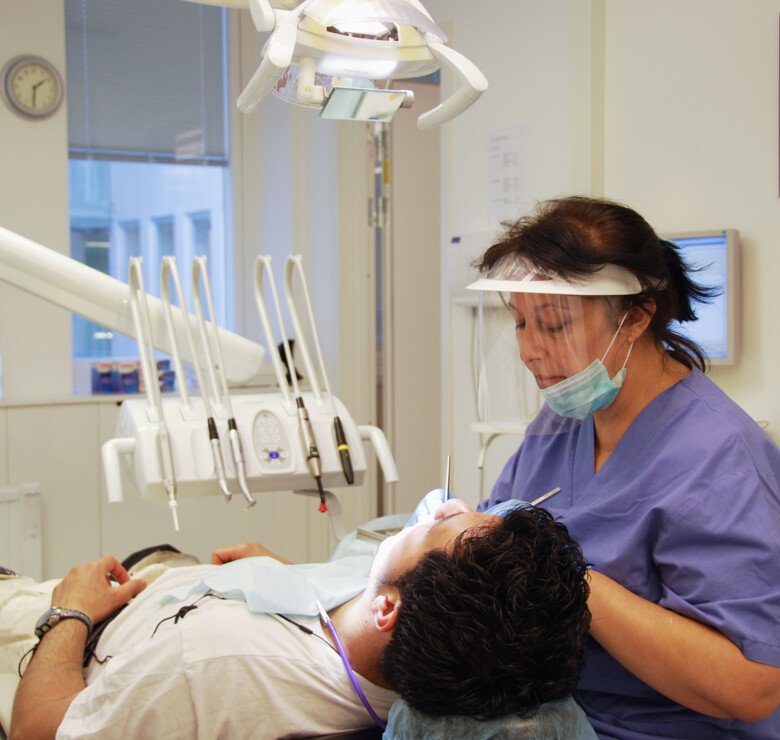Oral health among drug users
Principal Investigator
Patricia De Palma, DDS, PhD , Lecturer
Project: The oral health of a group of substance use disorders in Stockholm, Sweden
The aim of this study is to (1) describe the oral health among the substance use disorders and to relate it to the type and degree of substance use, (2) examine the participants’ knowledge of and attitude towards oral health and their choice of seeking or not seeking dental care.
The study population is a group of substance use disorders seeking treatment at different addiction clinics in Stockholm County Council. The participants received a free standard dental examination (clinical examination, radiology, clinical photography) and answer a few questionnaires (Oral health and oral habits, AUDIT-alcohol habits, DUDIT-drug habits, ASI (Addiction Severity Index) and GAF (Global Assessment of Functioning)-scale).
The study will be divided in a quantitative and a qualitative study. There have been no clinical studies done on substance use disorders in Sweden that we know of. Even though this is a group who has limited access to dental care and tends to neglects their own oral care and general health, there is little research in this area. This subject is therefore important from both a health aspect and a dental point of view.
Members:
- Sonja Rafat, PhD-student, Department of Dental Medicine, Karolinska Institute Huddinge, Sweden
- Björn Klinge, DDS Odont dr, Professor, Faculty of Odontology, Malmö University, Sweden and Department of Dental Medicine, Karolinska Institute Huddinge, Sweden
- Stefan Borg, MD, Associate Professor
- Mesfin Tessma, MD, MPH,Lecturer, Department of Learning, Informatics, Management and Ethics (LIME), Karolinska Institute Solna, Sweden
Financial support:
- The Stockholm Center for Dependency Disorders
Project: Oral Health among injecting drug users at needle exchange program in Stockholm (NEP)
The knowledge of injecting drug users’ oral health and how oral health is affected by severe addiction over time is limited. A large part of dental care has not been included in multidisciplinary care program that are currently established for this group of patients. This regardless of the documented knowledge about the oral health effects on the general health and vice versa.
Among drug addicts the oral health as well as the general health is affected often in early abuse with drug specific changes. These changes can be an indication of what the mainly substance for the user is. But the knowledge of drug specific changes in oral health is limited(3-6).The impaired oral health among drug users depend on neuropsychological induced behavioral changes but also direct physiological effects of the drugs. Neuropsychological behavioral changes among drug users often presents as depression, anxiety and memory loss. The lifestyle of drug users with the consequence of low use of established dental care, also contributes to impaired oral health. Patients who abuse or are addicted to drugs can also be a challenge for the dentist with treatment problems because of interactions with drugs as pain control and behavioral disorders (3, 4).Periodontitis and caries are common among drug addicts, probably because of poor oral hygiene, xerostomia and immunosuppressive effects by opioids. Cariogenic food, xerostomia and impaired oral hygiene in periods of drug abuse are probably contributing factors to high caries prevalence and activity, and also progression of periodontitis (3-6). Ersta Diakoni has on the request of Stockholm County to offer multidisciplinary healthcare to homeless and addicts in Stockholm. The work are conducted at Pelarbacken were also dental care is included as a part of the established cooperation around the patients.

Since 2013 a needle exchange program (NEP) is established in Stockholm with the aim to decrease the incidence of blood borne infections. Participants in NEP change used needles for new sterile ones and offers hygiene education to decrease risky behavior associated to injection. The program also aims to eventually reduce the use of drugs in this group, when the addicts established contacts with other healthcare- and social services like methadone programs, vaccination programs, primary- and dental care. By including the oral health in the screening of this group of patients it’s possible to get more knowledge about the oral health among injecting drug users and how the oral health is affected over time be surveyed. No monitoring over time has been done among injecting drug users.
Members:
- Tove Zander Dentist, Department of Dental Medicine, Karolinska Institute Huddinge, Sweden
- Margareta Hultin, DDS Odont dr, Department of Dental Medicine, Karolinska Institute Huddinge, Sweden
- Christer Lidman, MD, PhD, Department of Medicine, Karolinska Institutet, Stockholm
- Mesfin Tessma, MD, MPH,Lecturer, Department of Learning, Informatics, Management and Ethics (LIME), Karolinska Institute Solna, Sweden
Financial support:
- Ersta Hospital and Pelarbacken
